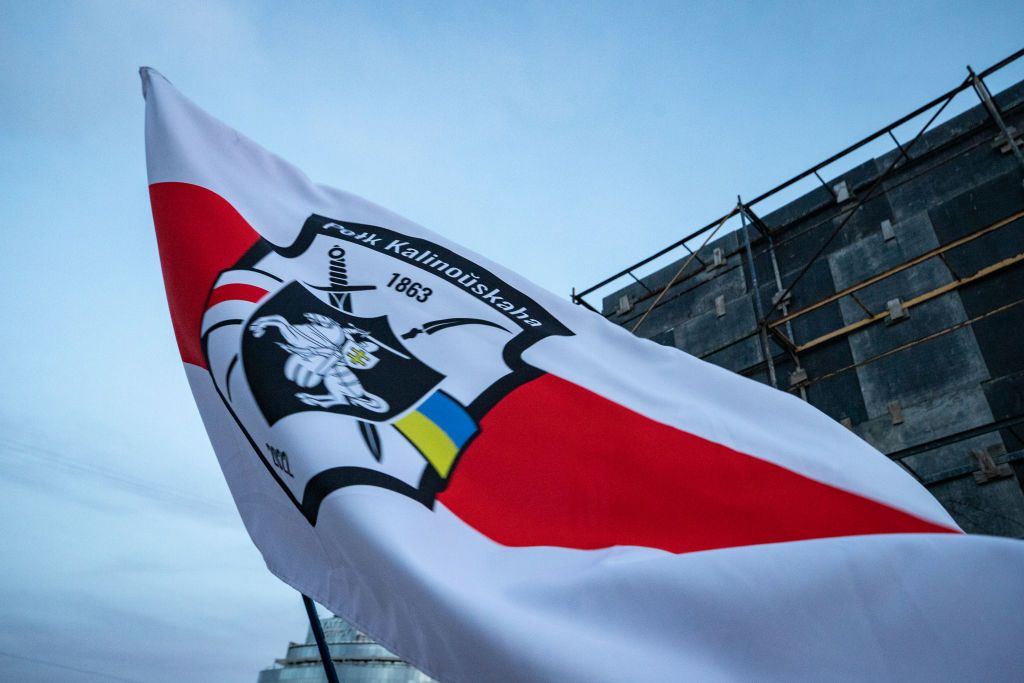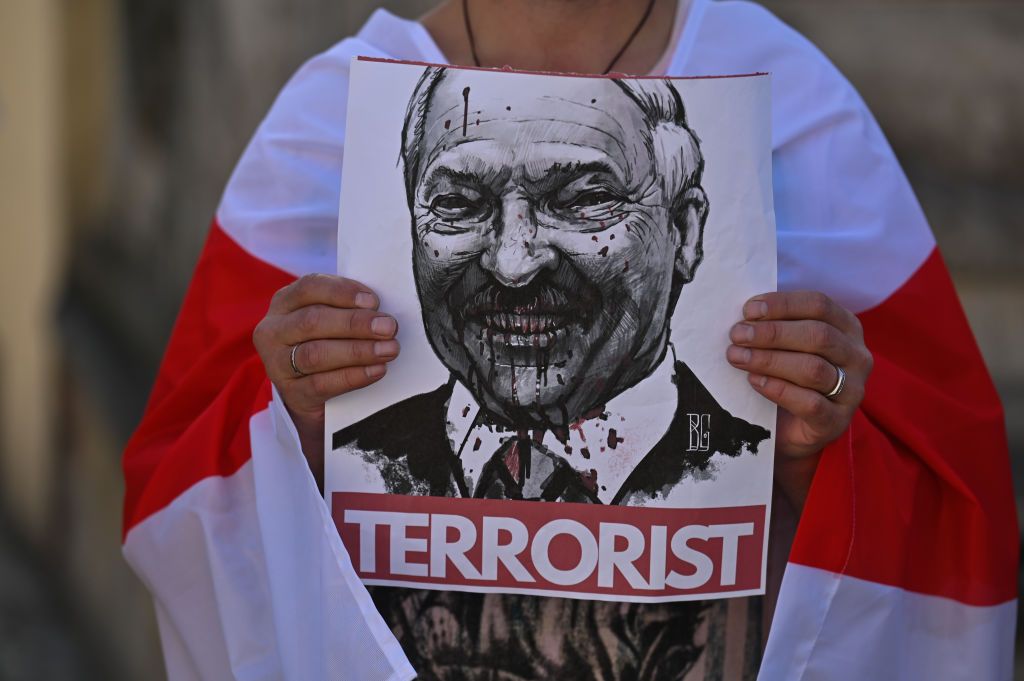Lithuania urges the International Criminal Court to investigate dictator Alexander Lukashenko and his regime for crimes against humanity, citing mass repression, deportations, and persecution of Belarusians.
Vladimir Putin of Russia announces amendments to nuclear doctrine, threatening nuclear response for aggression against Belarus.
IAEA director general confirms safety of controversial Belarusian Astraviets Nuclear Power Plant.
Baltic states and Poland seek EU funding for a joint defense line along borders with Belarus, Russia.
Belarus designates the Kastus Kalinouski Regiment as a terrorist organization.
Lithuania asks ICC to investigate Lukashenko for crimes against humanity
Lithuania has formally requested that the International Criminal Court or ICC investigate alleged crimes against humanity by the regime of Belarusian dictator Alexander Lukashenko, including deportations and persecution of Belarusian citizens.
The Lithuanian Ministry of Justice announced on Sept. 30 that it had referred to offenses against the civilian population in Belarus primarily carried out since May 2020, when the Lukashenko regime started to increasingly target civilians through deportation and to persecute its political opponents.
Lithuanian government accuses top Belarusian military officers, law enforcers, judiciary officials, and Lukashenko personally of waging a “widespread and systematic attack” on Belarusians, which includes “serious deprivation of fundamental rights; arbitrary detention, prosecution, and conviction; serious unlawful violence; unlawful killings; and sexual violence.”
By carrying out mass repression, Lithuania said, the Lukashenko regime has forced hundreds of thousands of Belarusians to flee the country and settle in neighboring states, including Lithuania, which may constitute the crime of mass deportation.
The leader of Belarusian exiled opposition, Sviatlana Tsikhanouskaya, hailed the move. “It brings hope to hundreds of thousands of victims of the regime,” she wrote on X.
The ICC prosecutor general confirmed the receipt of the referral in a statement, claiming that a preliminary examination of the request is due, and the results will determine whether the investigation will be opened. If commenced, the investigation could become grounds for the ICC to issue an arrest warrant for the Belarusian dictator.
Despite Belarus not being a party to the Rome Statute, the ICC has jurisdiction due to the crimes being committed on the territories of participating nations.
The case relies on the Myanmar/Bangladesh precedent, in which a state party to the Rome Statute of the ICC (Bangladesh) filed a case on crimes allegedly committed by Myanmar, which is not a Rome Statute signatory, maintaining that the crimes affected the said state party.
Lithuania, which previously succeeded in bringing charges against Russian President Vladimir Putin, said it is now seeking an arrest warrant for Lukashenko.
“Lithuania has taken the first step on behalf of (the regime’s) victims, but we urge and ask others to join us in doing what is essential and necessary for justice to prevail,” Lithuanian Justice Minister Ewelina Dobrowolska said.
According to a UN special rapporteur’s report, around 300,000 Belarusian citizens have fled the country in fear of persecution. Lithuania currently hosts around 60,000 Belarusians on its territory.
Russia amends nuclear doctrine, threatens nuclear response to aggression against Belarus
Russian President Vladimir Putin announced amendments to Russia’s nuclear doctrine on Sept. 25, claiming that Moscow reserves the right to use nuclear weapons if its closest ally, Belarus, is attacked.
During a meeting of the Russian Security Council on nuclear deterrence, Putin announced an array of modifications to Russia’s military doctrine that further blurred the terms for using Russia’s nuclear arsenal. One proposal, clearly aimed at the United States’ support for Ukraine, includes considering an act of aggression against Russia by a non-nuclear state, if it is backed by a nuclear state, as a “joint attack” on Russia.
Putin also stated that Russia might use nuclear weapons in the event of an attack with conventional weapons that posed a critical threat to Russia and Belarus.
Belarusian dictator Alexander Lukashenko thanked Putin for the amendments and claimed that an “attack on Belarus (would mean) World War III.”
Lukashenko also claimed that NATO countries had deployed troops on the border with Belarus, specifically in Poland. He gave no evidence to back his claim.
Putin’s announcement comes as the United States mulls permitting Ukraine to use Western weapons to strike deep into Russian territory. Experts believe Putin’s move is a clear warning to Western states in Russia’s “high-stake PR game.” “If you help Ukraine militarily, we may also target you.”
Kremlin spokesperson Dmitry Peskov confirmed on Sept. 26 that updates had been made to a document titled “The Foundations of State Policy in the Sphere of Nuclear Deterrence.”
Minsk, which has no nuclear weapons of its own, has also taken part in the Kremlin’s nuclear blackmail by signing on May 25, 2023 an agreement on the deployment of Russian non-strategic nuclear weapons in Belarus. The weapons were reportedly delivered shortly after, and Belarus took part in Russian nuclear drills in 2024. However, no evidence of the actual transfer of nuclear weapons from Russia to Belarus has ever been provided.
Lukashenko has been Putin’s steadfast ally, allowing Russian troops into Belarus to launch an attack on Kyiv from the north, and providing the Russian army with infrastructure and equipment.
Nuclear agency director visits Belarus, confirms country’s sole nuclear plant is safe
International Atomic Energy Agency Director General Rafael Grossi arrived in Belarus on Oct. 1 for high-level meetings and a visit to the country’s controversial Astraviets nuclear power plant.
Grossi and the team of experts were to assess the situation at the nuclear plant, which has been in operation for the past four years, and examine Belarus’ progress in “addressing the findings of an IAEA operational safety review in 2021,” according to an IAEA press release.
Following his visit to the nuclear power plant, Grossi stated that the operations at the Astraviets power plant were in line with international nuclear safety standards.
“There’s confidence in this country,” Grossi said in an excerpt from an interview published by the Belarusian Energy Ministry. “There’s confidence in neighboring countries, which is also important, that this unit does not bring any problems; on the contrary, it’s providing clean energy for this country.”
The Belarusian nuclear power plant in Astraviets is an ambitious project funded by a Russian credit line to Belarus and carried out by a Russian contractor. Built in the western Belarusian city of Astraviets, around 56 kilometers away from the Lithuanian capital Vilnius, the power plant has long been a problem for the Lithuanian authorities.
Lithuanian intelligence has claimed that Belarus concealed defects in the nuclear plant’s reactors, and said that cracks in the nuclear plant’s first reactor were spotted but not repaired.
Lithuania’s State Nuclear Power Safety Inspectorate (VATESI) called on Belarus in May 2023 to halt the operation of its nuclear power plant until all nuclear safety issues had been resolved.
During a meeting with Grossi, Lukashenko assured his guest that the nuclear power plant was safe. He labeled the concerns of neighboring Lithuania as “speculation.”
Critics claim the Astraviets plant was built with a host of flaws. The independent Belarusian investigative journalist team BIC said they had received internal documents specifying 18,000 flaws that needed correction. While none of them could generate a nuclear disaster, they rendered the plant idle for repair for 40% of its first year of operations.
Lithuania, formerly a major importer of Belarusian electricity, refused to continue purchasing energy due to concerns over the safety of the nuclear plant. In July, the Baltic states notified Belarus and Russia that they were disconnecting their electricity supply systems from the old Soviet energy grid and switching to the European power grid.
Ukraine, the second largest importer of Belarusian-generated electricity, made sporadic imports and then completely stopped buying Belarusian electricity in 2022.
Baltic States, Poland seek EU funding for defense line along borders with Russia, Belarus
NATO members Estonia, Latvia, Lithuania, and Poland will seek European funding for a joint project to build defenses along their border with Russia and Belarus, Estonian Defense Minister Hanno Pevkur Russia's full-scale invasion of announced on Sept. 28.
The Latvian, Lithuanian, Polish, and Estonian defense ministers met in Daugavpils, Latvia, to discuss funding and examine Ukraine’s experience in building its defensive structures. The ministers have also visited Latvia’s border in the Silene region.
“The need for a defense line stems from the security situation and supports NATO’s new forward defense concept,” Estonia’s public broadcaster ERR recorded Pevkur as saying.
The easternmost NATO members agreed to build a Baltic defense line on Jan. 19 this year, prompted by Russia’s war of aggression against Ukraine and Putin’s repeated threats against NATO states. In May, Poland announced the construction of a similar project, Eastern Shield, to reinforce its borders with the Russian exclave Kaliningrad and with Belarus.
The defense line, consisting of obstacles and field fortification measures, is designed to deter or slow down an attack at the countries’ borders. No minefields or barbed wire is planned for the line in peacetime.
The exact amount of requested aid remains unspecified. Earlier, some EU officials estimated the cost of building this defense line along the EU’s 700-kilometer border with Russia and Belarus would be around $2.67 billion.
Belarus designates Kalinouski Regiment as a terrorist organization

Belarus’ Supreme Court ruled on Sept. 25 that the Kastus Kalinouski Regiment, a Belarusian formation within the Ukrainian army, be declared a terrorist organization, according to the press office of the Belarusian Prosecutor General.
According to the Prosecutor General’s statement, the Kastus Kalinouski regiment and its members engaged in “recruiting, arming, training and employing terrorists” as well as “financing terrorist activities,” which ultimately resulted in alleged terrorist acts in Belarus.
The regiment, in an official statement, said it considers the designation “another step by the dictator toward the possible expansion of the war, and an additional declaration of loyalty to Moscow.”
The formation, consisting of Belarusian nationals, was incorporated in the Ukrainian Armed Forces in March 2022, in the early days of Russia’s full-scale invasion of Ukraine. As of January 2024, around 350 Belarusians were serving in the Kastus Kalinouski Regiment and other units of Belarusian volunteers defending Ukraine from Russian aggression, according to Andrei Kushnerau, the founder of the Association of Belarusian Volunteers.
In Belarus, the volunteers face prison terms on charges of creating an extremist formation, and their relatives are harassed by the Lukashenko regime’s law enforcement. At least 13 Belarusians have been jailed for intending to join the regiment and defend Ukraine, and ten have received prison terms for donating funds to Belarusian fighters, which is considered to be “war financing” by Belarusian prosecutors.
Of the approximately 1,300 Belarusians who have fought for Ukraine since 2014, sixty have been killed in action, and two taken prisoner by the Russian army.













